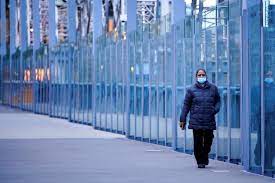Sydney COVID-19 cases fall as curbs ease in virus hotspots
SYDNEY, Sept 20 (Reuters) – Australia’s New South Wales (NSW) state on Monday reported its lowest rise in daily COVID-19 cases in more than three weeks as some lockdown restrictions were eased in Sydney, the state capital, amid higher vaccination levels.
Premier Gladys Berejiklian said 935 new cases had been detected in NSW, the lowest daily tally since Aug. 27, and down from 1,083 on Sunday. The state reported four more deaths.
“We’re feeling more positive than we have in a couple of weeks … but I don’t want any of us to sit back and think the worst is behind us,” Berejiklian told reporters in Sydney, warning of more deaths in the days ahead.
“Because we have seen the accumulation of so many cases, we know that October is going to be very challenging for our hospital system.”
Nearly half of Australia’s 25 million people is in lockdown after the Delta variant spread rapidly in Sydney and Melbourne, its largest cities, forcing officials there to abandon a COVID-zero target and shift to rapid vaccinations to ease curbs.
As the vaccine rollout gathers speed, with 53% of NSW’s adult population fully vaccinated, some restrictions on gatherings were relaxed on Monday in 12 of the worst-hit suburbs in Sydney’s west. Time limits for outdoor exercise were lifted, while the fully vaccinated people can gather outside in groups of five.
Neighbouring Victoria state, which includes Melbourne, logged one new death and 567 new infections, its biggest daily rise this year, a day after revealing its roadmap back to freedom when vaccinations reach 70%, expected around Oct. 26. read more
So far, 44% of people in the state have been fully vaccinated, below the national average of 47%.
Australia has largely lived in COVID-zero for much of the pandemic, recording 1,167 deaths and some 87,000 cases. About 56,000 cases have been registered since mid-June when the first Delta infection was detected in Sydney.
While NSW and Victoria bear the brunt of the Delta outbreak, most other states with little or no community transmission fear opening up too soon could overwhelm their hospital systems.












